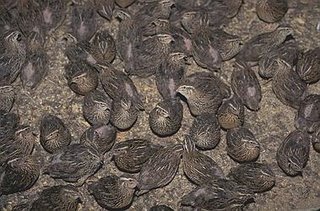
The quail has many advantages in comparison to any other small animal for home food production. The females begin to lay eggs at average of six weeks of age, and continue to produce eggs economically for at least a year. The extra males can be killed for meat at the age of 6 weeks. Even older animals are easy to butcher and can be prepared for food in a variety of ways. Birds need only a small amount of space. A cage permitting each bird 225 cm2 of floor space (44 birds per square meter) is the minimum requirement. The cage need not be more than 15 cm in height. Quail are efficient converters of feed. With each egg a female deposits an edible package of 8 percent of her own body weight (compared to 3 percent in the case of chickens).
On the other hand, quail have some disadvantages. The shrill crowing of the males can be disturbing. When males and females are mixed some males will peck at others so severely that they will blind them and eventually kill them. If not cleaned daily the cages can produce an odor. Quail are susceptible to some pests, parasites, and diseases that plague other poultry. Quail age more rapidly than other fowl and laying birds should be replaced each year. The chicks are quite small and tender, and easily destroyed by very small imperfections in their environment. They need to be protected in a brooder for 3 full weeks in the tropics. Once mature birds escape from cages they are difficult to recapture. During the short days of winter quail need supplementary lighting to keep them to keep them laying. A quail production system must take into account all of these points.
Below is a guide to Quail production:
1. Start with a pair that is 30-35 days old, with smooth feathers, and without streaks of white or black.
2. The pair must be of same stock. A Japanese quail weighs 100 grams at age 30-35 days, and 120 grams at 60 days. The older, the heavier.
3. The pair must come from good stock and good layers -- 65% is average for 30 days.
4. On the first five days, the brooders should be kept at 35°C temperature. Brooder is from 1-15 days old and at 30°C on the 10th day when the feathers and wings begin to grow.
5. Keep a lighted bulb to control the heat in the cage. Shield the bulb with paper.
6. After 10 days, remove the paper; cover the feeder with one-fourth mesh wire so as to keep the feed from being scratched out by the chicks. If the heat, food and water are adequate, mortality will be only be about 5%.
7. After 15 days, the birds may be transferred to their own coop. Transfer only the healthy ones and of the same sizes; separate the small ones.
8. Do not expose the birds to light more than 12 hours as they grow.
9. On the 35th day, males will develop dark brown feathers on the chest. Transfer them to the egg layers.
If the number of females equal that of males, 40 percent of them will lay eggs.
10. Put males with the egg layers only for hatching -- one male for every 6 females if the quail is Japanese. -- one male for every 3 females if the quail is American.
Source: Santinig, Sept. 6, 1991
According to researchers from the Tarlac College of Agriculture, it was observed that the quail lays more eggs if the feed will be supplemented with 5% copra meal, not more.
Source: PCARRD Farmnews Mar 15, 1983, www.echotech.org, photo from junglewalk.com.

dr quail is a producer of quality quail pullets, chicks ang eggs. for those who are interesyed in venturing or expanding your quail farm you may contact us for inquiries, reservations and we also conduct seminars at #09196297405 (denrick) and #09154292500 (rommel).
ReplyDeletethank you
do you have available layer quail? more or less 50 quails, we will use it on our thesis project, including male quail. thanks..
DeleteSir pwede delivery sa Cagayan de oro city?
Deletedo you sale you quails? and do you have 2-3 weeks old quail?
ReplyDeletedo you sale your quails? and do you have 2-3 weeks old quail?
ReplyDeleteGud morning...sir my husband is interested in quail business do you have here in iloilo city where we can buy the laying quail...thanks pls do reply
ReplyDelete